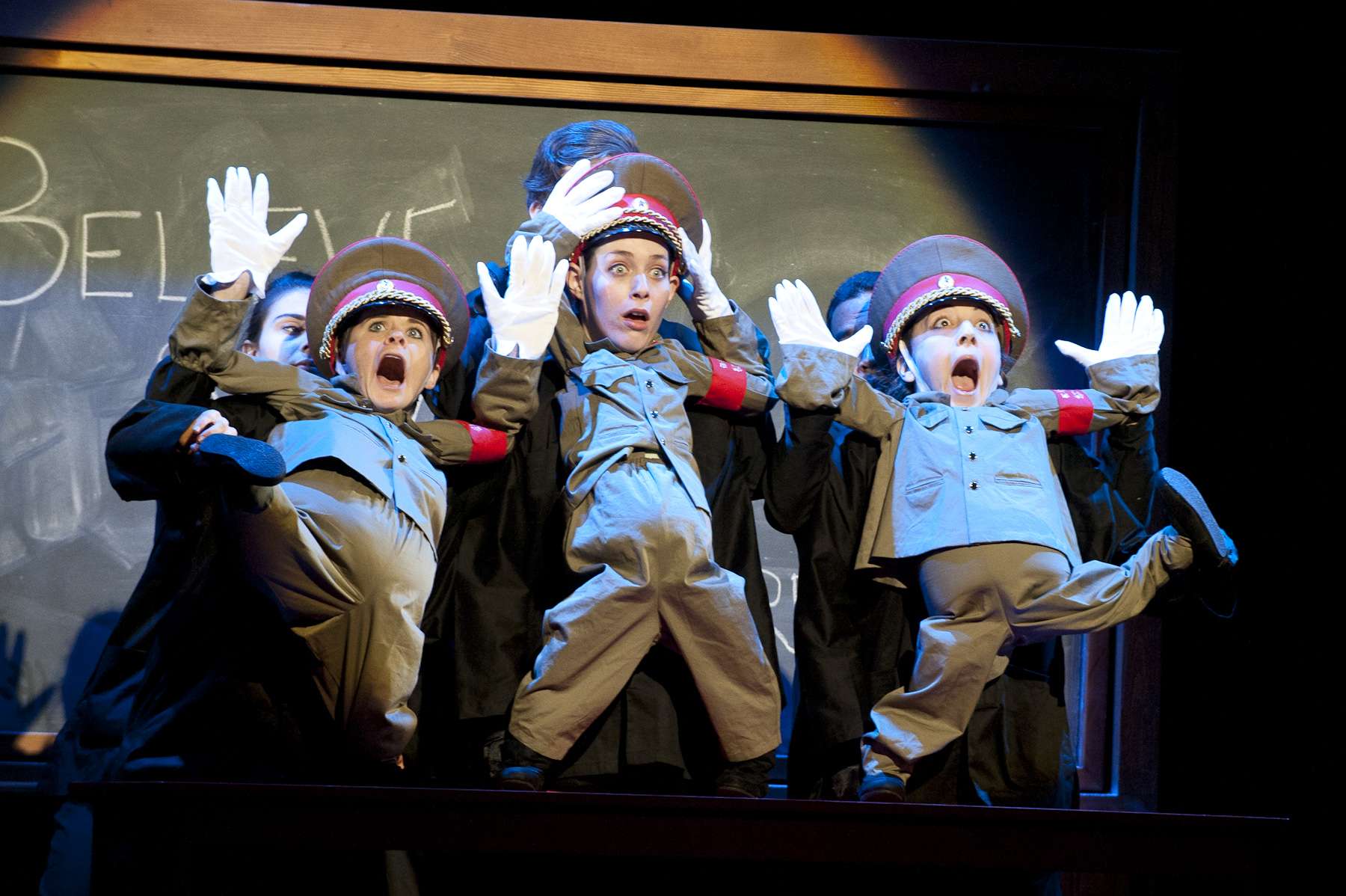|
Back
Transatlantic Triumph New York
Peter Jay Sharp Theater: Juilliard School
11/16/2011 - and November 18*, 20, 2011
Peter Maxwell Davies: Kommilitonen!
Will Liverman (James Meredith), Tobias Greenhalgh (The Voice of Pokayne/Gestapo Officer), Deanna Breiwick (Sophie), Leo Radosavljevic (Willi), Laetitia De Beck Spitzer (Clerk 1), Takaoki Onish (Clerk 2), Alexander Hajek (Hans), Noah Baetge (Christoph/Evangelist), Aubrey Allicock (Alexander/Grand Inquisitor), John Brancy (Janitor), Nathalie Mittelbach (Prison Guard), Lacey Jo Benter (Voice of the Mother), Wallis Giunta (Wu), Heather Engelbretson (Li), Jeongcheol Cha (Wu Tianshi (Father)), Karen Vuong (Zhou), Nathalie Mittelbach (Doctor), Simone Easthope (Officer Puppet), Laura Mixter (Officer Puppet), Rachael Wilson (Officer Puppet)
Juilliard Orchestra, Anne Manson (Conductor)
David Pountney (Librettist and Director), Robert Innes Hopkins (Set and Costume Designer), James Farncombe (Lighting Designer), Carolyn Choa (Choreographer), Blind Summit Theatre: Mark Down and Nick Barnes (Puppets)

(© Nan Melville)
Kommilitonen! was jointly commissioned by the Juilliard School in New York and the Royal College of Music in London. The opera premiered in London in March of this year and now, eight months later, has arrived in New York. This captivating and powerful work, written about students and performed by students, could not be more topical. David Pountney, the new chief executive officer and artistic director of the Welsh National Opera, wrote the libretto and also directed. In his illuminating program note, Pountney said that he and Sir Peter chose their subject in 2008 when student protests seem to be an extinct phenomenon. Then, of course, came the Arab Spring. And, more recently and more locally, there is Occupy Wall Street, a protest movement begun in New York and now gaining force nationally and internationally. In fact on opening night, a handful of protestors journeyed uptown to demonstrate in front of Juilliard.
For the opera, Pountney tied together three disparate calls for freedom and human dignity by students involved in political action. The first story tells of James Meredith's crusade to become the first black student to register at the University of Mississippi in 1962 -- an individual act of courage and sheer force of will that helped to ignite the prolonged and ultimately successful struggle for civil rights. The second story concerns Die weisse Rose, a protest movement intended to draw attention to the horrors of Nazi Germany and inspire protests against the regime. For their actions, the founders of the movement, brother and sister, Hans and Sophie Scholl, were executed in 1943.The name of the opera comes from the first word of their final leaflet.

(© Nan Melville)
The third story, Pountney has said, was meant to show the excesses of youthful zealotry.It chronicles the tale of another brother and sister during China’s Cultural Revolution. Their parents, who were denounced by their own children, were murdered by the Red Guards. Pountney has called Kommilitonen! a docu-opera. Others of this genre he mentions in his program note are the recent Royal Opera commission, Anna Nicole and its ancestor, La Traviata.
The staging was extraordinarily fluid – with one story dissolving into another. Musically, Sir Peter managed to meld together disparate musical styles and movements in a way that sounded vibrant, varied and often simply inspired. The score is filled with atonal harmonies but there are also echoes of gospel music (for Meredith), raucous Chinese military bands set against a solitary and delicate stringed solo, and even a bit of German lieder. The staging was brilliant and resourceful – using simple means to stunning effect. The quick cuts and scene changes between stories give the work something of the quality of film. For me, there were two especially memorable moments, both during the story of Die Weisse Rose. The students seemed transfixed by the wonder of their new printing machine, which Sir Peter transformed into a Mozartean music box. And then the leaflets the machine produced came cascading down from the balcony as audience members leaned reached up to grab them. It was so beautifully realized and so poignant. This was their final leaflet, distributed just before they were executed by the Nazis in 1943. The first line of the leaflet gave the opera its title.
The singing was uniformly excellent. Deanna Breiwick as Sophie and Will Liverman were particularly fine. The choreography was excellent, especially the complex movements during the Chinese story. Anne Manson conducted the Juilliard Orchestra with great energy and élan. When 77 year old Sir Peter took his curtain call, he looked very pleased indeed.
Arlene Judith Klotzko
|